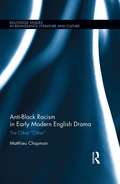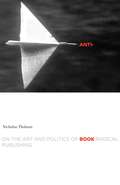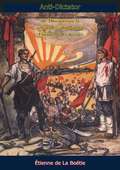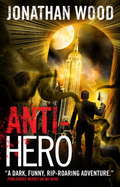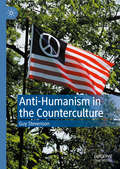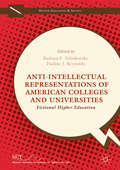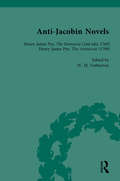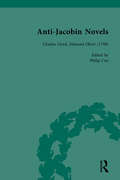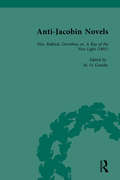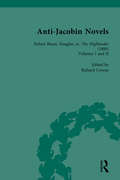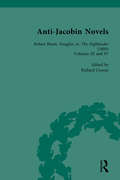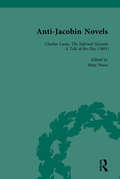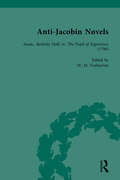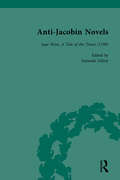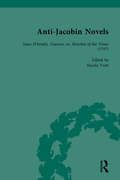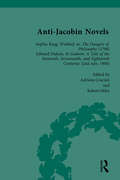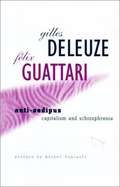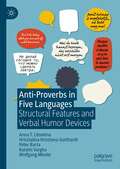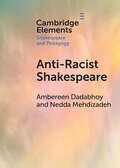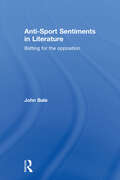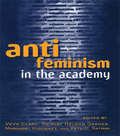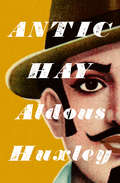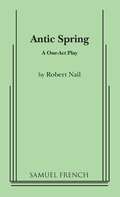- Table View
- List View
Anti-Black Racism in Early Modern English Drama: The Other “Other” (Routledge Studies in Renaissance Literature and Culture)
by Matthieu ChapmanThis is the first book to deploy the methods and ensemble of questions from Afro-pessimism to engage and interrogate the methods of Early Modern English studies. Using contemporary Afro-pessimist theories to provide a foundation for structural analyses of race in the Early Modern Period, it engages the arguments for race as a fluid construction of human identity by addressing how race in Early Modern England functioned not only as a marker of human identity, but also as an a priori constituent of human subjectivity. Chapman argues that Blackness is the marker of social death that allows for constructions of human identity to become transmutable based on the impossibility of recognition and incorporation for Blackness into humanity. Using dramatic texts such as Othello, Titus Andronicus, and other Early Modern English plays both popular and lesser known, the book shifts the binary away from the currently accepted standard of white/non-white that defines "otherness" in the period and examines race in Early Modern England from the prospective of a non-black/black antagonism. The volume corrects the Afro-pessimist assumption that the Triangle Slave Trade caused a rupture between Blackness and humanity. By locating notions of Black inhumanity in England prior to chattel slavery, the book positions the Triangle Trade as a result of, rather than the cause of, Black inhumanity. It also challenges the common scholarly assumption that all varying types of human identity in Early Modern England were equally fluid by arguing that Blackness functioned as an immutable constant. Through the use of structural analysis, this volume works to simplify and demystify notions of race in Renaissance England by arguing that race is not only a marker of human identity, but a structural antagonism between those engaged in human civil society opposed to those who are socially dead. It will be an essential volume for those with interest in Renaissance Literature and Culture, Shakespeare, Contemporary Performance Theory, Black Studies, and Ethnic Studies.
Anti-Book: On the Art and Politics of Radical Publishing (Cultural Critique Books)
by Nicholas ThoburnNo, Anti-Book is not a book about books. Not exactly. And yet it is a must for anyone interested in the future of the book. Presenting what he terms &“a communism of textual matter,&” Nicholas Thoburn explores the encounter between political thought and experimental writing and publishing, shifting the politics of text from an exclusive concern with content and meaning to the media forms and social relations by which text is produced and consumed. Taking a &“post-digital&” approach in considering a wide array of textual media forms, Thoburn invites us to challenge the commodity form of books—to stop imagining books as transcendent intellectual, moral, and aesthetic goods unsullied by commerce. His critique is, instead, one immersed in the many materialities of text. Anti-Book engages with an array of writing and publishing projects, including Antonin Artaud&’s paper gris-gris, Valerie Solanas&’s SCUM Manifesto, Guy Debord&’s sandpaper-bound Mémoires, the collective novelist Wu Ming, and the digital/print hybrid of Mute magazine. Empirically grounded, it is also a major achievement in expressing a political philosophy of writing and publishing, where the materiality of text is interlaced with conceptual production. Each chapter investigates a different form of textual media in concert with a particular concept: the small-press pamphlet as &“communist object,&” the magazine as &“diagrammatic publishing,&” political books in the modes of &“root&” and &“rhizome,&” the &“multiple single&” of anonymous authorship, and myth as &“unidentified narrative object.&” An absorbingly written contribution to contemporary media theory in all its manifestations, Anti-Book will enrich current debates about radical publishing, artists&’ books and other new genre and media forms in alternative media, art publishing, media studies, cultural studies, critical theory, and social and political theory.
Anti-Dictator: the Discours sur la servitude volontaire of Étienne de La Boétie
by Étienne de La BoétieThis famous essay asserts that tyrants have power because the people give it to them. La Boetie linked together obedience and domination, a relationship which would be later elaborated by anarchist thinkers. By advocating a solution of simply refusing to support the tyrant, he became one of the earliest advocates of civil disobedience and nonviolent resistance. “To him, the great mystery of politics was obedience to rulers. Why in the world do people agree to be looted and otherwise oppressed by government overlords? It is not just fear, Boetie explains in “The Discourse on Voluntary Servitude,” for our consent is required. And that consent can be non-violently withdrawn.”—Lew Rockwell
Anti-Hero
by Jonathan WoodWhen it rains it pours... monster machines. That attack during a funeral and ruin everyone's day. MI317--the government department devoted to defending Britain from cosmic horrors--is under siege, so Arthur Wallace and his team must travel to Area 51, ably--and oddly--assisted by Agent Gran. But their travels don't end there, not when there's an Arctic town populated entirely by spore zombies and the 2.0 version of Clyde has some funny ideas about how to save the world.
Anti-Humanism in the Counterculture
by Guy StevensonThis book offers a radical new reading of the 1950s and 60s American literary counterculture. Associated nostalgically with freedom of expression, romanticism, humanist ideals and progressive politics, the period was steeped too in opposite ideas – ideas that doubted human perfectibility, spurned the majority for a spiritually elect few, and had their roots in earlier politically reactionary avant-gardes. Through case studies of icons in the counterculture – the controversial sexual revolutionary Henry Miller, Beat Generation writers Jack Kerouac, Allen Ginsberg and William S. Burroughs and self-proclaimed ‘philosopher of hip’, Norman Mailer – Guy Stevenson explores a set of paradoxes at its centre: between romantic optimism and modernist pessimism; between brutal rhetoric and emancipatory desires; and between social egalitarianism and spiritual elitism. Such paradoxes, Stevenson argues, help explain the cultural and political worlds these writers shaped – in their time and beyond.
Anti-Intellectual Representations of American Colleges and Universities: Fictional Higher Education (Higher Education and Society)
by Barbara F. Tobolowsky Pauline J. ReynoldsThis book explores popular media depictions of higher education from an American perspective. Each chapter in this book investigates the portrait of higher education in an exciting array of media--including novels, television, film, comic books, and video games--revealing the ways anti-intellectualism manifests through time. Examining a wide range of narratives, the authors in this book provide incisive commentary on the role of the university as well as the life of students, faculty, and staff in fictional college campuses.
Anti-Jacobin Novels, Part I, Volume 1
by Robert Miles Amanda Gilroy Philip Cox W M Verhoeven Claudia L JohnsonA selection of Anti-Jacobin novels reprinted in full with annotations. The set includes works by male and female writers holding a range of political positions within the Anti-Jacobin camp, and represents the French Revolution, American Revolution, Irish Rebellion and political unrest in Scotland.
Anti-Jacobin Novels, Part I, Volume 2
by Robert Miles Amanda Gilroy Philip Cox W M Verhoeven Claudia L JohnsonA selection of Anti-Jacobin novels reprinted in full with annotations. The set includes works by male and female writers holding a range of political positions within the Anti-Jacobin camp, and represents the French Revolution, American Revolution, Irish Rebellion and political unrest in Scotland.
Anti-Jacobin Novels, Part I, Volume 3: British Conservatism And The French Revolution (Cambridge Studies In Romanticism Ser. #48)
by Robert Miles Amanda Gilroy Philip Cox W M Verhoeven Claudia L JohnsonA selection of Anti-Jacobin novels reprinted in full with annotations. The set includes works by male and female writers holding a range of political positions within the Anti-Jacobin camp, and represents the French Revolution, American Revolution, Irish Rebellion and political unrest in Scotland.
Anti-Jacobin Novels, Part I, Volume 4
by Robert Miles Amanda Gilroy Philip Cox W M Verhoeven Claudia L JohnsonA selection of Anti-Jacobin novels reprinted in full with annotations. The set includes works by male and female writers holding a range of political positions within the Anti-Jacobin camp, and represents the French Revolution, American Revolution, Irish Rebellion and political unrest in Scotland.
Anti-Jacobin Novels, Part I, Volume 5
by Robert Miles Amanda Gilroy Philip Cox W M Verhoeven Claudia L JohnsonA selection of Anti-Jacobin novels reprinted in full with annotations. The set includes works by male and female writers holding a range of political positions within the Anti-Jacobin camp, and represents the French Revolution, American Revolution, Irish Rebellion and political unrest in Scotland.
Anti-Jacobin Novels, Part II, Volume 10
by Richard Cronin Philip Cox Adriana Craciun W M Verhoeven Claudia L JohnsonA selection of Anti-Jacobin novels reprinted in full with annotations. The set includes works by male and female writers holding a range of political positions within the Anti-Jacobin camp, and represents the French Revolution, American Revolution, Irish Rebellion and political unrest in Scotland.
Anti-Jacobin Novels, Part II, Volume 6
by Richard Cronin Philip Cox Adriana Craciun W M Verhoeven Claudia L JohnsonA selection of Anti-Jacobin novels reprinted in full with annotations. The set includes works by male and female writers holding a range of political positions within the Anti-Jacobin camp, and represents the French Revolution, American Revolution, Irish Rebellion and political unrest in Scotland.
Anti-Jacobin Novels, Part II, Volume 7
by Richard Cronin Philip Cox Adriana Craciun W M Verhoeven Claudia L JohnsonA selection of Anti-Jacobin novels reprinted in full with annotations. The set includes works by male and female writers holding a range of political positions within the Anti-Jacobin camp, and represents the French Revolution, American Revolution, Irish Rebellion and political unrest in Scotland.
Anti-Jacobin Novels, Part II, Volume 8
by Richard Cronin Philip Cox Adriana Craciun W M Verhoeven Claudia L JohnsonA selection of Anti-Jacobin novels reprinted in full with annotations. The set includes works by male and female writers holding a range of political positions within the Anti-Jacobin camp, and represents the French Revolution, American Revolution, Irish Rebellion and political unrest in Scotland.
Anti-Jacobin Novels, Part II, Volume 9
by Richard Cronin Philip Cox Adriana Craciun W M Verhoeven Claudia L JohnsonA selection of Anti-Jacobin novels reprinted in full with annotations. The set includes works by male and female writers holding a range of political positions within the Anti-Jacobin camp, and represents the French Revolution, American Revolution, Irish Rebellion and political unrest in Scotland.
Anti-Oedipus: Capitalism and Schizophrenia
by Gilles Deleuze Félix GuattariThis is an essential text for feminists, literary theorists, social scientists, philosophers, and others interested in the problems of contemporary Western culture.
Anti-Proverbs in Five Languages: Structural Features and Verbal Humor Devices
by Wolfgang Mieder Anna T. Litovkina Hrisztalina Hrisztova-Gotthardt Péter Barta Katalin VarghaThis book is the first comparative study of English, German, French, Russian and Hungarian anti-proverbs based on well-known proverbs. Proverbs are by no means fossilized texts but are adaptable to different times and changed values. While anti-proverbs can be considered as variants of older proverbs, they can also become new proverbs reflecting a more modern worldview. Anti-proverbs are therefore a lingo-cultural phenomenon that deserves the attention of cultural and literary historians, folklorists, linguists, and general readers interested in language and wordplay.
Anti-Racist Shakespeare (Elements in Shakespeare and Pedagogy)
by Nedda Mehdizadeh Ambereen DadabhoyAnti-Racist Shakespeare argues that Shakespeare is a productive site to cultivate an anti-racist pedagogy. Our study outlines the necessary theoretical foundations for educators to develop a critical understanding of the longue durée of racial formation so that they can implement anti-racist pedagogical strategies and interventions in their classrooms. This Element advances teaching Shakespeare through race and anti-racism in order to expose students to the unequal structures of power and domination that are systemically reproduced within society, culture, academic disciplines, and classrooms. We contend that this approach to teaching Shakespeare and race empowers students not only to see these paradigms but also to take action by challenging and overturning them. This title is also available as Open Access on Cambridge Core.
Anti-Sport Sentiments in Literature: Batting for the Opposition
by John BaleThis book draws on literature, specifically on the writings of selected novelists and poets to widen an existing anti-sport discourse to include hitherto excluded voices from the world of literature. The book commences with a review of exiting pro- and anti-sport discourses and then proceeds to examine, in turn, the written works of five eminent authors, excavating from their writings their anti-sports rhetorics. These writers are Lewis Carroll (Charles Dodgson), Charles Hamilton Sorley, Jerome K. Jerome, John Betjeman and Alan Sillitoe. In its conclusion, the book draws together the broad themes discussed in the preceding chapters. Innovative in its approach to sport and literature and remarkable for its not having been previously explored in any depth, this book will be of interest to readers from both social sciences and humanities backgrounds.
Anti-feminism in the Academy
by Ketu H. Katrak Margaret Higonnet VèVè Clark Shirley Nelson GarnerContending that the anti-feminist backlash in the academy is part of the broader "politically correct" rhetoric, this collection of writers, academics and activists is a much-needed response to the assault on feminist thinkers and critics in the academy today.
Antic Hay
by Aldous HuxleyHuxley's brilliantly unconventional novel of a young man who jeered at moral respectability
Antic Hay (Flamingo Modern Classics Ser.)
by Aldous HuxleyA lost generation searches for meaning in chaotic post-WWI London in this satirical novel by the acclaimed author of Brave New World. First published in 1923, Aldous Huxley&’s Antic Hay was banned in Australia and burned in Cairo for its frank depiction of bohemian life in the grim and listless aftermath of the Great War. Set in London, the comic novel follows a large cast of artists and intellectuals through their nihilistic yet determined pursuits. But at the center of these colorful characters is the peculiar man behind Gumbril&’s Patent Small Clothes. While sitting on the hard oak pews of his school&’s chapel, disenchanted schoolmaster Theodore Gumbril Junior fantasizes about a pair of trousers with an inflatable air cushion in the seat to make the endless sermon more tolerable. Deciding on a whim to pursue this absurd invention, Gumbril moves to London and soon finds himself among a circle of cynical poets, would-be artists, and bohemian philosophers. Though a timid romantic, Gumbril fashions a rakish alter ego for himself, &“The Complete Man,&” as he pursues his fortunes in this scathing satire of British conventionality.
Antic Street
by Robert NailComedy, 3m, 3f; Placing emphasis on pantomine and character portrayal, it needs only six chairs-- to represent an open touring car. In the car are young people of high school age going on a picnic. There is Ginger, earnest and overbearingly sunny; Robert, the sensitive one, impressed only by poetry (or ants, as a hilarious final scene proves); Blossom, the exuberant and idiotic teenager; Sam and Gwendolyn, the lovers who live-- in thirty minutes-- a life of adolescent violence, ranging from rage to young soulfulness; and Elbert, the little brother who looks with noisy criticism on their actions and suffers their company only for the food likely to be served. The relations of these, oddly assorted six, put to the trials and tribulations of a picnic, result in situations of merriment and in dialogue flippant, fast and rich in performance possibilities.
